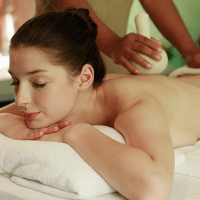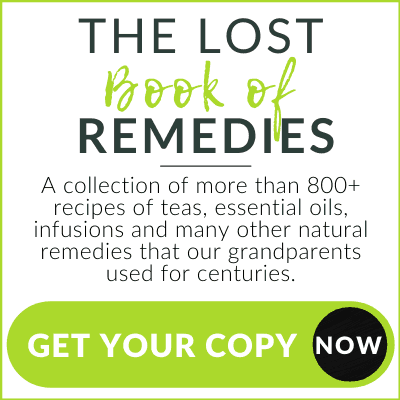In addition to the dietary changes advocated in the previous chapter and the minerals and vitamins highlighted as recommended supplements, there are several herbal remedies and solutions that you can take which many women find helpful for alleviating the more severe symptoms of PMS.
As most women have a fairly good idea of when they can expect to suffer the first “twinges” of PMS, they drink camomile tea two or three times every day for a week or two weeks before the anticipated onset of their PMS attack.
Not only is camomile tea famously calming, it is also a mild diuretic which will help to purge excess liquid from your body which in turn helps to reduce the unpleasant bloated feelings commonly associated with premenstrual syndrome.
There are stronger herbal diuretics available as well.
In this category, you should might seek out and take herbal extracts of dandelion, juniper or nettle, all of which will help your body to purge excess water in advance of PMS setting in. Try using dandelion extract or dried leaves as the basis of a tea because not only does this help to banish water from your body, it is also believed to help fight against urinary tract infections and cystitis.
There are many other natural substances that are also believed to have diuretic qualities as well. For example, green tea has been used as a natural diuretic foodstuff and drink in China for many centuries, whereas cranberry juice is also believed to aid your body in expelling water as quickly as possible as well.
Fennel is another substance that has diuretic qualities and as it is also believed to be a herbal remedy that helps to calm you down, it would be an ideal choice at those times when the worst of PMT sets in!
There are even some every day foodstuffs that have been shown to possess diuretic qualities as well. In this list, you would include asparagus, brussel sprouts, oats, cabbage, lettuce and tomatoes.
Hence, if in the “lead up” to the time when you expect PMS to hit, you ensure that your diet is “top-heavy” in these foods, you can help to minimize the chances of excess water retention (but of course, do not use excess salt when cooking them!).
Unlike chemical-based diuretics, these totally natural water-banishing herbal remedies work by gently strengthening the ability of your kidneys to expel water from your body more quickly.
Consequently, using natural diuretics is far less likely to have adverse side-effects although you would be well advised not to go too crazy because expelling liquid from your body too quickly is not going to do you a great deal more good than banishing it too slowly is!
Natural herbal remedies do not only have diuretic qualities however. Many other benefits are attached to other herbal release which can help to offset the worst effects of PMS.
For example, brewers yeast (saccharomyces cerevisiae) is sometimes seen as being one of nature’s super foods, and with some justification.
As suggested previously, it is generally agreed that vitamin B is extremely important for women who suffer from PMS and brewers yeast is an excellent source of all of the vitamins in the B group (except for B12). It is a very rich source of niacin and vitamin B6 which between them help to produce serotonin which you already know is important to aid your fight against PMS.
Not only this, it also contains several other vitamins, 16 amino acids and around 14 minerals including magnesium, chromium and manganese. Once again, I have already mentioned that having sufficient amounts of these particular minerals in your body is extremely helpful when fighting against premenstrual syndrome.
Both evening primrose and starflower oil are a rich source of gamma linolenic acid (GLA) which helps to regulate hormone balance and has also been shown to help reduce swelling, breast soreness, irritability and mood swings.
Evening primrose in particular is extremely effective for reducing abdominal swelling and breast soreness, whilst the acids in starflower oil also help to reduce blood pressure and cholesterol levels and skin complaints whilst also boosting your natural immune system.
As suggested earlier, one of the medical remedies that many doctors prescribe for PMS is an increase in progesterone levels in your body brought about by consuming or using hormone supplements in one form or another.
Whilst many women might feel a little uncomfortable about the idea of taking chemically produced hormones in this way, it is interesting to note that there is a perfectly natural alternative available which you can use to achieve pretty much the same thing.
This is because the herb wild yam contains phytoprogesterone, which is a totally natural form of progesterone that is highly effective for regulating the female metabolism.
Consequently, it is commonly used for treating conditions and symptoms related to the menopause and also as a natural alternative to using chemically produced hormones to reduce the severity of PMS attacks. On top of this, because of its antispasmodic and anti-inflammatory qualities, it is a herb that is often consumed to counteract the pain associated with conditions like arthritis as well as the pain associated with PMS.
Another natural substance that is used in premenstrual syndrome treatment is Angelica sinensis or Dong Quai which is a dried root that has been used in traditional Chinese medicine for hundreds of years to help women with menstrual problems. Because it is also one of the best non-animal sources of vitamin B12, Dong Quai is another herbal remedy that has a double benefit for any woman who suffers from premenstrual syndrome.
As you now know, many women who are suffering from PMS are prescribed Prozac, but in certain Western European countries, there is a totally natural alternative to Prozac that is in fact prescribed more regularly than the drug itself. This is because St John’s wort has been shown to be every bit as effective as Prozac for dealing with stress, anxiety and depression but the potential adverse side effects of taking this totally natural solution are far less dangerous or invasive.
This is not to say that there are no potential adverse side-effects whatsoever, because in extremely rare cases, St John’s wort has been seen to cause photosensitivity and minor stomach problems.
Nevertheless, the side-effects are usually compared to those of a placebo which in itself suggests that the dangers of taking St John’s wort as an alternative to Prozac should be far less of a concern. In short, if psychological problems are a major feature of your PMS, St John’s wort is certainly worth a try.
One final natural foodstuff that might help some women offset the worst adverse effects of PMS are isoflavones which are most commonly found in soya beans and associated soya-based products.
Research on the effects of isoflavones has suggested that they could represent a viable natural alternative to the kind of hormone replacement therapy that is commonly used to deal with the menopause. However, given their effectiveness as a natural hormone replacement, including soya beans and soya products in your diet may very well help to reduce the worst effects of premenstrual syndrome.
It is no coincidence that whilst many Western women suffer when going through the menopause, it is far less of a problem in Japan where soya forms a significant percentage of the diet. Indeed, there is not even an equivalent word in Japanese for “hot flushes” which most Western women become all too painfully familiar with when suffering the menopause.







